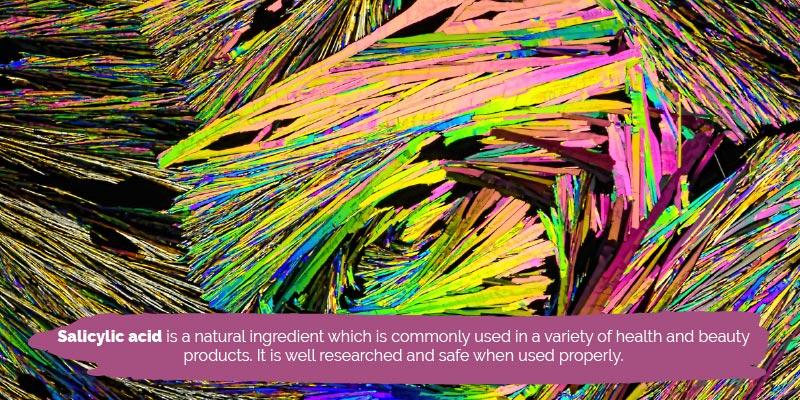When we hear the name salicylic acid, we aren't exactly jumping out of our chairs to start putting it on our skin. Scary sounding name aside, salicylic acid is one of the most common and effective acne-fighting ingredients out there. It is also important to understand that there is a wide variety of products on the market which use salicylic acid as an active ingredient. Some salicylic acid products require a prescription while others are over-the-counter.
To make sense of all of this, we will be exploring exactly what is in salicylic acid, how it fights against acne, and how to use these products effectively for healthy, glowing skin!

What is Salicylic Acid?
According to the U.S. National Library of Medicine, "Salicylic acid is a beta hydroxy acid that occurs as a natural compound in plants. It has direct activity as an anti-inflammatory agent and acts as a topical antibacterial agent due to its ability to promote exfoliation." It is naturally derived from the leaves of wintergreen and white willow trees.
It is an odorless compound with a light coloration. Salicylic acid is also on the World Health Organization's list of essential medicines under the "medicines affecting skin differentiation and proliferation" section. This type of acid is effective due to its ability to remove a thin layer from the top layer of a patient's skin without causing any harm.
Long story short, salicylic acid is a natural ingredient which is commonly used in a variety of health and beauty products. It is well researched and safe when used properly.

Salicylic Acid as an Anti-Inflammatory Agent
Aspirin has long been touted as the miracle drug - and for good reason! The multitude of applications and overall safety of aspirin has been proven since its initial invention in the late 1800's. Aspirin's chemical makeup is acetylsalicylic acid or (ASA). By now you have probably guessed that a variation of salicylic acid is one of the primary components of aspirin.
While aspirin itself is not used for skincare, it is certainly used as an anti-inflammatory. When used topically or ingested, this family of compounds has the ability to reduce inflammation throughout the body. This is one of the reasons why salicylic acid is effective in treating acne, warts, psoriasis, and other common skin conditions.
Another example of the anti-inflammatory uses of this unique acid is its usage as an antacid. Brands such as Pepto-Bismol use salicylic acid as part of their active ingredients for stomach relief. That's a lot of heavy lifting for a single ingredient!

Does Salicylic Acid Get Rid of Acne?
Absolutely! Products with salicylic acid are amongst the most commonly used and highly effective on the market.
These products generally work by unclogging pores and keeping them unclogged. Dead skin cells, dirt, and other impurities can cling to the skin, causing an oily buildup and ultimately, that acne we are all hoping to avoid! Salicylic acid is effective at exfoliating skin while removing these impurities. That's precisely why Dr. Leslie Baumann, MD, recommends keeping things simple and incorporating salicylic acid into your regimen. Not only does it help to keep pores clear, but "it also has anti-aging effect," she states.
Another benefit of salicylic acid as an acne treatment is its relative gentleness. This goes back to the anti-inflammatory effects. Rather than overly drying your skin and eroding away the bad stuff, these products will also reduce swelling of the skin, leaving it looking and feeling refreshed and clean.
Avoiding Mistakes that May Worsen Your Acne
That being said, salicylic acid based products must still be used correctly to reap the benefits. Avoid the following mistakes for best results:
Stick to one acne treatment at a time. We have often heard the old adage "cast a wide net". Well, when it comes to managing acne, a wider net may just lead to bigger problems. For example, mixing a salicylic acid and benzoyl peroxide may lead to complications. It will also wreak havoc on your skin.
Use acne products as directed. As an extension of the last point, more is not always better! Natural acne remedies take time to produce results. This is paid by tenfold by the fact that the results will be better and longer lasting than some other treatment methods.
Avoid getting skin too dry. Finally, acne treatments generally work on the principle of drying skin to reduce oily buildup. Skin must still have some moisture to remain healthy. Avoid excess cleaning and/or scrubbing when using products with salicylic acid.
Salicylic Acid can make for a gentle, yet effective acne treatment, especially when a part of a comprehensive, solid skincare regimen that includes a healthy diet, and products designed specifically for your skin type, with ingredients geared towards controlling breakouts. To learn more go to GLOWBIOTICS Skincare101 section on acne prone skin.







